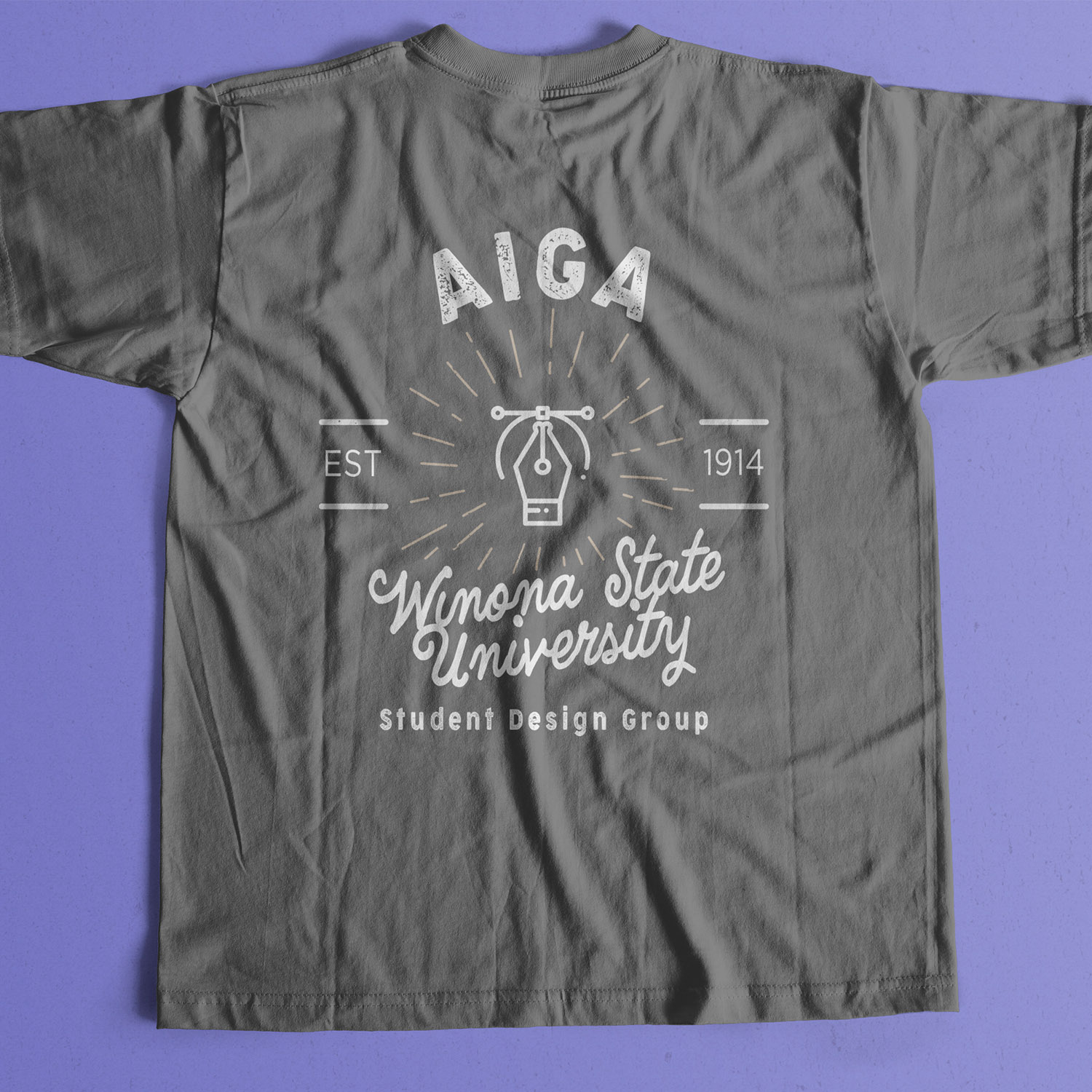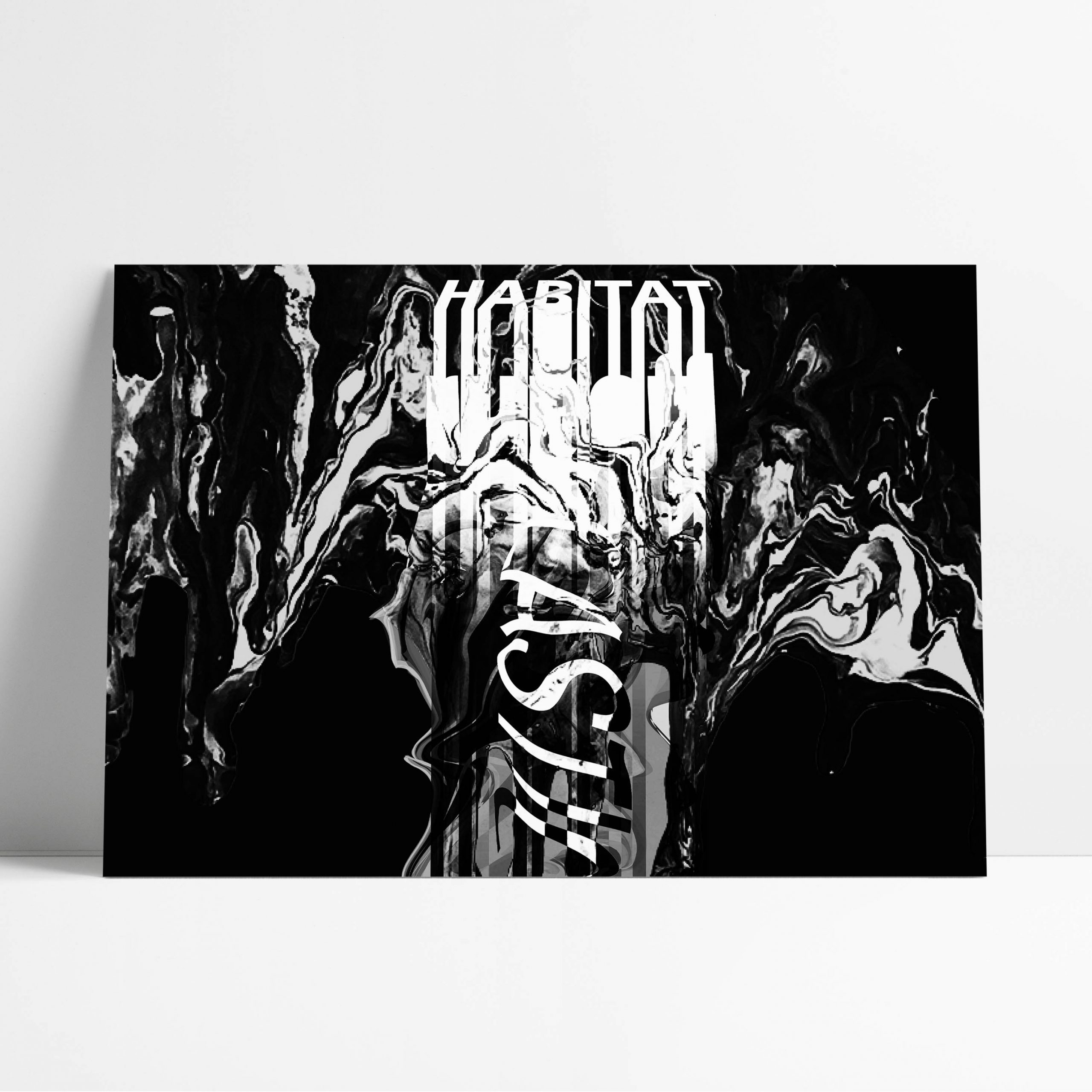
Graphic Design is a traditional design program relying on strong fine and liberal arts foundations, integrated with contemporary multi-disciplinary practices. Although the program is predominantly based in the Art & Design Department, students will also take courses in the Computer Science, Communication Studies, Marketing, and Mass Communication departments. Upper-division coursework is integrated among all four departments.
Building on a foundation in design, drawing, studio arts, and art history, students work with current graphic design software, gaining experience in print design and web design.
The capstone experience includes required participation in the Senior Design Exhibition and internship in the graphic design field with a regional business.
Please note that design students are required to use Apple Laptop Computers. WSU ITS provides all students with Macbook Pro Laptops. Technology fee in tuition covers full Creative Cloud Suite. See more about campus devices.
In their business & marketing classes, students will learn business and marketing strategy, entrepreneurship, design manufacturing and production, etc. The study of design and business are intertwined with creativity as a foundation to allow students to thrive in their future careers.
In their Studio Art classes, students will learn basic skills in painting, drawing, photography, and advanced experimentation and abstraction skills in contemporary art.
In their computer science classes, students will learn to use technology to creatively solve problems, leverage the use of databases and content management systems, and understand the fundamentals of website building.
In their mass communications classes, students will take courses in advertising principles, copywriting, media planning and buying, ad and advertising campaigns.
Graphic Design (ARTG)
B. A. Major (66 total credits)
Graphic Design is a traditional design major relying on strong fine and liberal arts foundations, integrated with contemporary multi-disciplinary practices. Although the program is predominantly based in the Art & Design Department, students will also take courses in the Computer Science, Communication Studies, Marketing, and Mass Communication departments.
Building on a foundation in design theory, studio arts, and art history, students work with professional design software and technology as they investigate contemporary design practices and emergent visual communication media. Through critical inquiry and innovative collaboration, students showcase diverse creative works in the Senior Design Exhibition during their final semester as the culmination of their undergraduate education.
Students are encouraged to declare Graphic Design as their major upon entering WSU.
Application for formal admission, which takes place in the second semester in the major, requires that students:
- Complete (or be currently enrolled in) ART 150 – Digital Design Fundamentals, ART 243 – Typography and Information Design, and ART 118 – Foundational Drawing.
- Demonstrate software competency. Intermediate level software skills in Photoshop, Illustrator and InDesign are required to take advanced level design courses. Students will be evaluated through their Design Program Application Portfolio. An additional software test is required if a portfolio does not convey the required software skills.
- Submit a portfolio of analog and digital work along with the application form. Because seats are limited, admission to the program is competitive, based on preparation, portfolio, and academic record. Students who are not admitted may reapply.
- ART 118 – Foundational Drawing (3 credits)
- An examination of fundamental concepts in the art of drawing, while students acquire basic studio skills. This course develops visual perception, aesthetic judgment, and sound studio practice. May include work from the nude model. Grade or P/NC. Offered each semester. Recommended to be taken fall semester of your first year in the program.
- ART 150 – Digital Design Fundamentals (3 credits)
- This foundation design course introduces the student to the principles of digital art and design. This is a required course for all design majors. Students will examine a variety of current design tools, which include but are not limited to digital software (Adobe Acrobat, Adobe Photoshop, Adobe Illustrator, and Adobe InDesign), Wacom tablets and touch based devices, as well as explore fundamental elements of design thinking and standard design practices and methodologies. Prerequisite: instructor permission. Grade only. Offered each semester. Recommended to be taken fall semester of your first year in the program. Note: This course has a $100 lab fee.
- ART 217 – Foundational Painting (3 credits)
- Beginning studio practice using oil paint. Students explore basic problems of form and space on a two-dimensional surface using traditional and contemporary methods. Proper studio practices such as color mixing, canvas building, and material usage are stressed. Students learn about the historical value of painters and painting technique through presentations and on-site museum visits. Prerequisite: ART 118 – Foundational Drawing. Grade only. Offered annually (usually spring semester) Recommended to be taken spring semester of your first year in the program.
- ART 218 – Color and Composition (3 credits)
- This course emphasizes the theory, mixing, ideology, psychology, and usage of color as it pertains to art and design through drawing, painting, and digital media. This course also focuses on strengthening an understanding of composition through structuring a work of 2-Dimensional art. Prerequisite: ART 118 – Foundational Drawing or instructor permission. Grade only. Offered annually (usually spring semester). Recommended to be taken spring semester of your second year in the program.
- ART 243 – Typography and Information Design (3 credits)
- This class is a fundamental investigation of the expressive principles and potential of typographical form as a critical element intended to convey or evoke a message, statement, idea or emotion through different formats of visual communications and digital media (still and motion). Prerequisite: ART 150 – Digital Design Fundamentals or instructor permission. Grade only. Offered annually (usually spring semester). Recommended to be taken spring semester of your first year in the program. Note: This course has a $100 lab fee.
- ART 260 – Visual and Layout Design (3 credits)
- Students develop a deeper understanding of two-dimensional layout design bridging the gap between traditional print and web design. Using design thinking methodology, students are challenged to develop targeted designs like infographics, data visualizations, small publications, and user interface design. Prerequisites: ART 118 – Foundational Drawing, ART 150 – Digital Design Fundamentals, and ART 243 – Typography and Information Design. Grade only. Offered annually (usually fall semester). Recommended to be taken fall semester of your second year in the program. Note: This course has a $100 lab fee.
- ART 265 – Tactile and Environmental Design (3 credits)
- Students develop a deeper understanding of three-dimensional tactile design that involves material and environmental studies. Through the use of design thinking, students are challenged to develop targeted and innovative products utilizing their skills in packaging, paper engineering, installation, 3D printing, and sustainable design. Students also learn how to document their works by using the product shots. Prerequisites: ART 150 – Digital Design Fundamentals, ART 118 – Foundational Drawing, and ART 243 – Typography and Information Design. Grade only. Offered annually (usually spring semester). Recommended to be taken spring semester of your second year in the program. Note: This course has a $100 lab fee.
- ART 277 – Digital Imaging (3 credits)
- This course will explore the technical and conceptual fundamentals of digital imaging with an emphasis on lens-based practices. Students are encouraged to explore the possibilities of the medium, embrace creative risk, and tackle aesthetic concerns as they learn and refine their craft. The course will consist of lectures, demonstrations, studio sessions, class critiques, and explorations of the work of a range of digital and photographic artists. Grade or P/NC. Offered annually. Recommended to be taken fall semester of your second year in the program.
- ART 360 – New Media and Technology Design (3 credits)
- Students develop a deeper understanding of time-based and interactive media design. Through the use of design thinking, students are challenged to develop targeted and innovative products using digital tools and programming skills. The course explores coding script, video, human computing interaction, visual coding, virtual reality, augmented reality, digital 3D modeling and the latest technological advancements. Prerequisites: ART 150 – Digital Design Fundamentals, ART 118 – Foundational Drawing, ART 243 – Typography and Information Design, and CS 116 – Web Technology I. Grade only. Offered annually (usually fall semester). Recommended to be taken fall semester of your third year in the program. Note: This course has a $100 lab fee.
- ART 365 – Campaign and Systems Design (3 credits)
- In this course, students utilize creative thinking and profound design skills in both digital and analog formats. Students will complete live projects oriented towards publicity campaign while integrating aspects of 2D, 3D, and new media design practices into visual systems. Prerequisites: ART 260 – Visual and Layout Design, ART 265 – Tactile and Environmental Design, ART 350 – Junior Portfolio Review, and ART 360 – New Media and Technology Design. Grade only. Offered annually (usually fall semester). Recommended to be taken fall semester of your fourth year in the program. Note: This course has a $100 lab fee.
- ART 375 – Advanced Design Project (1-3 credits)
- The course offers students the opportunity to develop in individual and guided environment advanced design projects. In addition to the advancement of current design and problem solving skills, the course focuses on developing creative processes and methodologies as a path to effective design solutions. Prerequisites: ART 260 – Visual and Layout Design or ART 265 – Tactile and Environmental Design or ART 360 – New Media and Technology Design, and instructor permission. Grade only. Offered each semester. Recommended to be taken fall semester of your fourth year in the program. Note: This course has a $100 lab fee. Repeatable up to 4 times.
- ART 398 – Special Topics in Creative Practices (3 credits)
- This class is an advanced investigation of the expressive principles and potential of contemporary creative practices in the field of studio art and design. Topics vary in response to the changes in the different fields of studio art and design. Students explore creative practices to convey or evoke a message, statement, idea or emotion through different formats or artistic studies, visual communications and media. Prerequisites: ART 118 – Foundational Drawing or ART 150 – Digital Design Fundamentals and instructor permission. Grade only. Offered annually or when demand warrants. Repeatable as topics change. Recommended to be taken spring semester of your third year in the program.
- ART 460 – Portfolio and Professional Development (3 credits)
- A continued exploration of current professional design practices with primary emphasis on design theories of conceptual visualization for presentation and self-promotion. Through research, discussions, oral presentations, and practical explorations, students will prepare and finalize solutions for individual creative identity and collateral material. Students will also study readings in design criticism and semiotics, including recent or emerging design trends. This is the final step in the Graphic Design/I-Design curriculum whereby students create targeted portfolio pieces for career development. Prerequisite: ART 365 – Campaign and Systems Design or instructor permission. Grade only. Offered annually (usually spring semester). Note: This course has a $100 lab fee. Recommended to be taken spring semester of your fourth year in the program.
- ART 350 – Junior Portfolio Review (0 credits)
- A zero-credit course completed by participation in the scheduled portfolio review in either fall or spring of the student’s junior year. Portfolio reviews are scheduled every semester and allow for in-depth conversations between individual students and faculty about the student’s progress, strengths, and creative identity. Students will select 10-12 works for review, hanging them in departmental galleries. P/NC only. Offered each semester. Note: Students fulfill course requirements by participating in portfolio review. Recommended to be taken spring semester of your third year in the program.
- CS 116 – Web Technology (3 credits)
- An introductory, hands-on course on Internet website development. The emphasis is for students to develop competence using web authoring tools and tools for incorporating multimedia into a web page in order to build a complex website focused on some area of academic interest. Students will learn how to plan and publish websites and develop electronic portfolios that are exciting, efficient, accessible, and well-designed. Students will gain insight into the technology behind the World Wide Web by working with CSS (cascading style sheets) and HTML (hypertext) markup language. No prior programming experience is necessary for this course. Grade or P/NC. Recommended to be taken spring semester of your second year in the program.
- CMST 266 – Professional Communication Skills (3 credits)
- Explore and apply theories necessary for appropriate and effective communication in diverse professional and organizational settings. The course emphasizes group collaboration, and oral communication skills, including presentational speaking and the use of presentational technology. The course prepares students to interview for and work in organizational settings, internships, and consulting. Meets GOAL 1. Grade only. Offered annually. Recommended to be taken fall semester of your second year in the program.
CHOOSE ONE:
- AAD 301 – The Arts Organization (3 credits)
- This seminar course will present an overview of arts and other nonprofit organizations in the United States. It will also explore current issues and emerging trends in technology, arts and cultural policy, intellectual property rights, career development in the arts sector, and the challenges facing administrative leaders of arts and cultural organizations. A significant component of this course includes field trips and in-class visits by professionals from various arts disciplines. Grade only. Offered annually. Recommended to be taken spring semester of your third year in the program.
- AAD 302 – Introduction to Arts Administration (3 credits)
- This course will introduce students to the practical skills required for the successful management of arts organizations. Topics will include budgeting, marketing/publicity, fundraising, audience development, analysis of financial statements, contracts, board governance, and issues associated with the founding of a nonprofit organization. Grade only. Offered annually. Recommended to be taken spring semester of your third year in the program.
- MCOM – 210 – Visual Communication (3 credits)
- Basic visual communication theory as it applies to mass communication with practical, hands-on application. Students explore visual literacy, aesthetics, design principles, creativity, critical evaluation of images in a variety of media, and the ethics of visual communication. Grade only. Recommended to be taken fall semester of your second year in the program.
CHOOSE ONE:
- ART 377 – The Constructed Photograph (3 credits)
- This course builds on ART 277 to provide students with in-depth knowledge of how to create images with lens-based equipment and software as well as critical analysis skills of how those images function in western culture. Assignments will challenge students to create images from multiple source files that include the study of High Dynamic Range imaging, images built with digitally “collaged” content, panoramic technology and the various “filters” that now inform how photographic imagery is communicated. Through making and studying images, students will define what a photograph “is” in the expanding world of digital imagery as they question the veracity of photographically-based imagery we encounter on a daily basis. Prerequisite: ART 277 – Digital Imaging or instructor permission. Grade or P/NC. Offered annually (usually spring semester). Note: To complete course assignments, students must have access to a digital camera with manual exposure control and ability to capture RAW files (most likely a Digital Single Lens Reflex (DSLR), and digital storage to back up their work. Repeatable up to 6 credits. Recommended to be taken spring semester of your second year in the program.
- ART 418 – Body of Work (3 credits)
- Students will create a series (body of work) consisting of 5-10 pieces with a meaningful direction. Students are prepared for not only Senior exhibitions, but for thinking about their work on a more conceptual and robust manner. Students research, write, sketch, create thumbnails, and present their findings through artist statements and their work. Prerequisite: ART 317 – Contemporary Studio Practices. Grade only. Offered annually (spring semester). Note: Three credits required for Studio Arts majors, additional credits count toward studio elective credits. Repeatable up to 6 credits. Recommended to be taken spring semester of your fourth year in the program.
- MKTG 300 – Principles of Marketing (3 credits)
- Principles of Marketing provides a market-oriented perspective to business decision-making. Market-oriented decision-making utilizes concepts, frameworks and processes to understand buyers, competitors, and the marketing environment in order to select target markets and develop the company’s value proposition. Core marketing decisions involve developing and managing the product, it’s pricing and its distribution, and communicating the offer to the marketplace. Successful marketing results in customer satisfaction and loyalty while accomplishing the company’s sales and profit objectives. Incorporating multiple perspectives of stakeholders with an explicit customer focus characterizes marketing’s role in producing ethical and responsible business decisions. Prerequisite for College of Business majors and minors: Admission to the College of Business. Prerequisites for non-College of Business majors and minors: Junior standing and instructor permission. Grade only. Recommended to be taken fall semester of your fourth year in the program.
CHOOSE ONE:
- MKTG 265 – Introduction to Professional Selling (3 credits)
- Learning professional selling concepts and the communications skills to apply them. Topics include interpersonal communications in business, relationship building, prospecting and qualifying, determining customer wants and needs, sales presentation, and negotiation and post-sale communications. Employment opportunities in sales are examined. Prerequisite: completion of a minimum of 15 credits. Grade only. Offered each semester. Recommended to be taken spring semester of your fourth year in the program.
- MKTG 329 – Sports Marketing (3 credits)
- Sports’ marketing focuses on the different problems presented in developing promotional programs for sports teams, events, products and services. Emphasis will be placed on professional and collegiate level teams and events, and on international and national brands. A survey of potential sports-related jobs is included. Student fee may be required. Prerequisites for College of Business majors and minors: Admission to the College of Business and MKTG 300 – Principles of Marketing. Prerequisites for non-College of Business majors and minors: Junior standing and instructor’s permission. Grade only. Recommended to be taken spring semester of your fourth year in the program.
- MKTG 333 – Topics in Marketing (3 credits)
- Various courses offered in conjunction with curriculum needs and the availability of faculty with relevant expertise. Prerequisites for College of Business majors and minors: admission to College of Business and MKTG 300 – Principles of Marketing. Prerequisites for non-College of Business majors and minors: junior standing and instructor permission. Grade only. Repeatable. Recommended to be taken spring semester of your fourth year in the program.
- MKTG 336 – Services Marketing (3 credits)
- This course examines how services can be developed and marketed to increase customer satisfaction and retention in order to extend an organization’s sustainable competitive advantage. Topics include the measurement and management of service quality, service recovery, linking customer measurement to performance, customer and employee roles in service delivery, and how standard marketing topics such as pricing and promotion apply to services. Prerequisites for College of Business majors and minors: Admission to the College of Business and MKTG 300 – Principles of Marketing. Prerequisites for non-College of Business majors and minors: Junior standing and instructor’s permission. Grade only. Recommended to be taken spring semester of your fourth year in the program.
- MKTG 338 – Branding (3 credits)
- This course examines the relevant concepts involved in the management of brands both in the context of consumers and in organizations. A distinguishing characteristic of modern marketing has been its focus on the creation of differentiated brands. Topics will include identifying and developing bases of brand differentiation; researching and establishing unique brand associations using product attributes, brand marks, names, packages, distribution strategies, and promotional strategies; understanding brand equity and its value to an organization; designing marketing programs to build brand equity; turning around brands in crisis; managing brands over time; and understanding the issues involved with international branding. Prerequisites for College of Business majors and minors: Admission to the College of Business and MKTG 300 – Principles of Marketing. Prerequisites for non-College of Business majors and minors: Junior standing and instructor’s permission. Grade only. Recommended to be taken spring semester of your fourth year in the program.
- MKTG 339 – Digital and Social Media Marketing (3 credits)
- This course examines digital marketing principles including website development, content development, social media, search engine marketing, email marketing, and web analytics. Students learn tools and techniques for applying core marketing concepts as the framework for successful digital marketing promotional plans. Students explore current and future trends in social media platforms and other digital marketing media to identify which are most appropriate for specific types of products and services. Prerequisites for College of Business majors and minors: Admission to College of Business and MKTG 300 – Principles of Marketing. Prerequisites for non-College of Business majors and minors: Junior standing and instructor permission. Grade only. Offered each semester. Recommended to be taken spring semester of your fourth year in the program.
- MKTG 341 – E-Commerce (3 credits)
- Through a business application, this course directly applies marketing strategies and concepts to a practical commerce-based website. It prepares future business decision makers for the rapidly changing world of web business practices. Prerequisites for College of Business majors and minors: Admission to the College of Business and MKTG 300 – Principles of Marketing. Prerequisites for non-College of Business majors and minors: Junior standing and instructor’s permission. Grade only. Recommended to be taken spring semester of your fourth year in the program.
- MKTG 363 – Integrated Marketing Communications (3 credits)
- This course provides students with an in-depth understanding of each tool in the promotional mix (advertising, direct marketing, interactive/internet marketing, sales promotion, publicity/public relations, and personal selling) from the perspective of the marketing manager. Students learn how to apply each tool in implementing the organization’s marketing strategies and accomplishing its marketing objectives. Prerequisites for College of Business majors and minors: Admission to the College of Business and MKTG 300 – Principles of Marketing. Prerequisite for non-College of Business majors and minors: Junior standing and instructor’s permission. Grade only. Recommended to be taken spring semester of your fourth year in the program.
- ART 399 – Internship (1-3 credits) (Design Apprenticeship)
- Work-related experience in appropriate settings such as museums, art centers, commercial offices or studios, and public relations offices. Credit hours to be arranged by a faculty member. May be used as a general art elective. Prerequisite: Junior or senior standing. Grade or P/NC. Repeatable up to 9 credits. Recommended to be taken fall semester of your third year in the program.
CRITICAL ANALYSIS/MATH STATS INTENSIVE COURSE (3 credits)
- ART 360 – New Media/Tech Design
ORAL INTENSIVE COURSE (3 credits)
- ART 460 – Portfolio/Professional Development
WRITING INTENSIVE COURSES (6 credits)
- ART 365 – Campaign/Systems Design
- ART 441 – History of Modern Design













